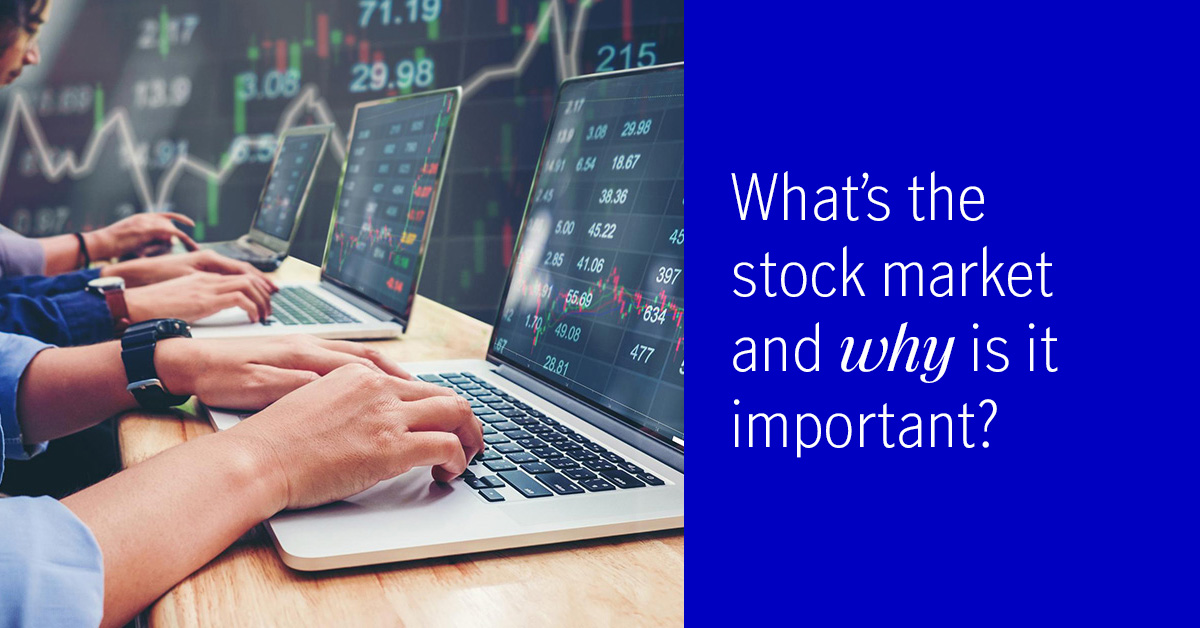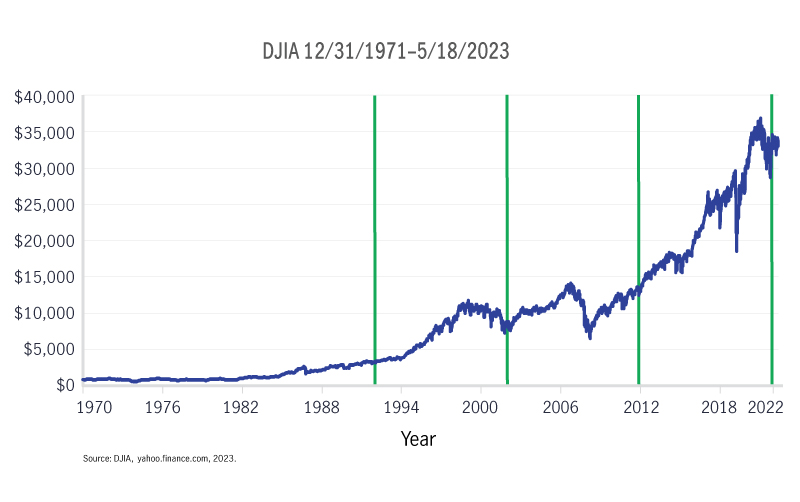What’s the stock market and why is it important?
Even though there’s news about the stock market and investing daily, more than half of American workers say they’re not knowledgeable about selecting and managing investments for their retirement plan.¹ If you put your investment knowledge in that category, we’ve got a series of helpful videos and articles for you. Although investments and the stock market may use words you’re not used to, with a little time, we can help you get to know the basics, starting with how the stock market works.

Getting to know the stock market
Whether you have a little extra cash you’d like to invest or you have a retirement savings plan—such as a 401(k) or an individual retirement account (IRA)—you may be interested in investing in the stock market. Before jumping into the market, it’s good to have an understanding of what it is and how it operates. To help you get started, we’ll answer five key questions in this article:
- What’s a stock?
- What’s the stock market?
- What are stock exchanges?
- What’s a broker?
- Why is the stock market important?
 With Scott Francolini, Head of Strategic Relationship Management and Consulting
With Scott Francolini, Head of Strategic Relationship Management and Consulting
1 What’s a stock?
A stock is a type of investment that represents ownership of a company. A company’s overall stock is broken into shares, each of which equates to an equal-sized portion of the business.
For example, let’s say you’ve started a business using your own money, and you need more money to be able to expand. You could get that money by taking a loan from a bank or finding private investors on your own. Or you can sell part of your business by issuing shares of stock and going public. Going public means that shares of your stock will be available for purchase by the public.
2 What’s the stock market?
The stock market is where the public can go to buy shares of stock. In many ways, it’s just like any other kind of market, such as a grocery store or farmers’ market. A farmers’ market is a central location where several different farmers can gather to sell their goods. Customers can walk around the market, look at all the options, and buy what they want.
The stock market is very similar—it refers to a central spot where people come together to buy and sell stocks and other investment vehicles, such as mutual funds (which are basically funds that group a number of stocks together). But instead of being one single market, the stock market is made up of a few smaller markets, called stock exchanges.
3 What are stock exchanges?
Stock exchanges are the businesses that actually facilitate the buying and selling of stock. Stock that’s available on one exchange is generally not available on other exchanges. In the United States, we have two primary stock exchanges:
- The New York Stock Exchange
- The NASDAQ (which stands for National Association of Securities Dealers Automated Quotation System, although most people just call it the NASDAQ)
All stock exchanges operate online. Although the New York Stock Exchange (NYSE) is well known for its physical location on Wall Street in New York City, most exchanges operate exclusively online and have no physical presence.
Learn more: When did the stock market open in the United States?
Learn more: When did the stock market open in the United States?
In 1790, the first stock exchange to open in the United States was the Philadelphia Stock Exchange.
Two years later, the New York Stock Exchange was born and has grown to be the largest in the world today.
In 1971, the NASDAQ opened, revolutionizing stock trading with its quicker, automated, and electronic system—and it’s now the second largest stock exchange in the world.
But you can’t just walk into the NYSE building on Wall Street, go up to the counter, and put in an order to buy 10 shares of ABC company. To buy shares, you need to work through a broker.
4 What’s a broker?
Brokers are individuals or companies that can buy and sell stock through the stock exchanges for their clients. If you wanted to buy 10 shares of a company, you’d have to:
- Set up an account with a broker,
- Deposit money into your account, and
- Submit an order to buy 10 shares of the company with the cash in your account.
Your broker would take your order and use your cash to buy the stock you want from someone else who wants to sell the same stock.
If you have a brokerage account, you can invest in stocks, bonds, mutual funds, and many other types of investments. If you have a retirement savings account—such as a 401(k) or an IRA—you generally can’t invest in individual stocks, but you can invest in bonds, mutual funds, and other investments that are available in the market.
5 Why is the stock market important?
The stock market helps both businesses and investors by:
- Offering companies a place to raise money to help grow their business and the economy
- Enabling individuals to choose from a wide range of investments and give their retirement savings a chance to grow in value over time
The value of the stock market and the value of the shares traded in a single day are an important part of the economy. They indicate how the companies in the stock market are performing, how people feel about the companies in the stock market, and how people feel about various aspects of the economy. That’s why you hear that the stock market is up (people generally feel good about the market) or down (people are generally feeling bad about the market) on a given day.
To make it easy to measure the performance of the stock market, most people use a stock market index. There are several well-known indexes available—e.g., the Dow Jones Industrial Average (DJIA), the S&P 500, the NASDAQ Composite, and the NYSE Composite—and they all do the same thing: Track the changes in value of a representative group of companies. When the index goes up, the collective value of the stocks it follows has increased; when the index goes down, the value of the stocks has gone down. Usually, when you hear a news report that the market is up or down, they’ll refer to an index.
Over time, the value of the stock market tends to grow, as you can see below, which looks at the DJIA—also called the Dow—as an indicator of the market’s performance. (The DJIA tracks 30 of the country’s largest publicly owned companies.) As you can see, there can be a lot of change from day to day or month to month—referred to as market volatility. But you can also see that over longer periods of time, the value of the market has historically gone up.
Despite occasional downturns, the stock market has gone up since 1971

The stock market, investing, and your retirement plan
The stock market offers vast investment opportunities to the general investor. If you consider opening a brokerage account, you’ll have access to stocks and bonds, mutual funds, and many other types of investments. If you have a retirement savings plan—such as a 401(k) and IRA—you generally won’t be able to invest in individual stocks. Depending on the type of plan you have, you may have access to other stock market investments, such as mutual funds, bond funds, collective investment trusts, stable value funds, and more. These investments represent different asset classes, which is the subject of our next video and article in this series, to help you build on what you’ve learned today about investing and the stock market.
If you participate in a John Hancock retirement plan, you may log in here.
For complete information about a particular investment option, please read the fund prospectus or offering memorandum/trust document. You should carefully consider the objectives, risks, charges, and expenses before investing. The prospectus or offering memorandum/trust document contains this and other important information about the investment option and investment company. Please read the prospectus or offering memorandum/trust document carefully before you invest or send money. Prospectus or offering memorandum/trust document may only be available in English.
Perspectives on market volatility
Visit our market volatility resource page for more helpful articles about the financial markets and the economy.
Important disclosures
Important disclosures
Neither asset allocation nor diversification guarantees a profit or protects against a loss.
There is no guarantee that any investment strategy will achieve its objectives.
Past performance does not guarantee future results.
Collective investment trusts are privately offered. Information on this investment is not available in local publications.
Stable value portfolios typically invest in a diversified portfolio of bonds and enter into wrapper agreements with financial companies to prevent fluctuations in their share prices. Although a portfolio will seek to maintain a stable value, there is a risk that it will not be able to do so, and participants may lose their investment if both the fund's investment portfolio and the wrapper provider fail.
All mutual funds are subject to market risk and will fluctuate in value.
It is your responsibility to select and monitor your investment options to meet your retirement objectives. You should review your investment strategy at least annually. You may also want to consult your own independent investment or tax advisor or legal counsel.
The content of this document is for general information only and is believed to be accurate and reliable as of the posting date, but may be subject to change. It is not intended to provide investment, tax, plan design, or legal advice (unless otherwise indicated). Please consult your own independent advisor as to any investment, tax, or legal statements made.
John Hancock Retirement Plan Services LLC offers administrative and/or recordkeeping services to sponsors and administrators of retirement plans. John Hancock Trust Company LLC provides trust and custodial services to such plans. Group annuity contracts and recordkeeping agreements are issued by John Hancock Life Insurance Company (U.S.A.), Boston, MA (not licensed in NY), and John Hancock Life Insurance Company of New York, Valhalla, NY. Product features and availability may differ by state. Securities are offered through John Hancock Distributors LLC, member FINRA, SIPC.
Securities are offered through John Hancock Distributors LLC, member FINRA, SIPC. John Hancock
Investment Management Distributors LLC is the principal underwriter and wholesale distribution broker dealer for the John Hancock mutual funds, member FINRA, SIPC.
2924233 8/23 MGR0810232924233


